江苏省句容市天王中学:Unit3 单元知识梳理 学案(牛津译林版七年级上册)
江苏牛津译林七年级上册Unit 3语法
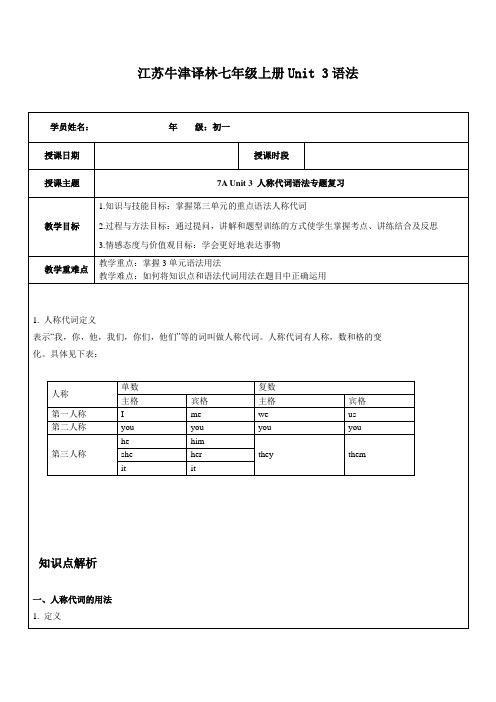
江苏牛津译林七年级上册Unit 3语法( )4、Nancy and Kate are good friends. ________ are both from England.A.WeB. YouC. They( )5、Boys and girls, keep calm and be confident. I am sure all of you are __________ excellent students.A. anB. aC. /( )6、The retired couple have decided to go to college.It'stime for to begin a newlife.A.they B.them C.their D.theirs( )7、Miss Smith, an American lady, has taught _______ English for three years.A.we B.us C.our( )8、My brother will come to see me tomorrow. I’ll meet ___ at the airport.A. herB. youC. himD. them( )9、I am Cindy Brown.You can call_____ Cindy.A.me B.him C.us( )10、Thanks for inviting _______ to dinner, Nancy. I really enjoyed it.A. herB. himC. youD. me( )11、Could you record today’s NBA basketball game for me? I can watch _____ ___ later.A.oneB.myC. it( )12、—What a nice model plane!— Thanks. I made it with 3-D printer by______.A.meB.himC.itselfD. myself( )13、---I like red best. What about___________?---My favourite colour is orange. It represents joy.A.youB.herC.himD.it( )14、Peter is old enough to look after _______A. heB. himC. himself( )15、—Biology is my favourite subject.—Mr. Green teaches __________ Biology, I guess. He teaches so well.A.yourB.youC.yourD. yourself( )16、Our English teacher often tells _______ to speak more English in class.A. weB. usC. ourD. ours( )17、John often teaches physics in his free time.A.himB. heC. himselfD.his( )18、I can’t find my football. Could you help ______find it?A.him B.her C.me D.them( )19、—Sally, could you go and help your father wash the car?—Why ____________? I’m busy now. Amy is lying on the grass doing nothing.A. meB. IC. himD. her( )20、We should take good care of _________ when we are in foreign countries.A. usB. ourC. oursD. ourselves( )21、I always have a small notebook with , and I write down new words.A.IB. meC. myD. mine( )22、Don’t just wait for the tutors’ help. As a m iddle school student, you should learn to teach _____ .A. yourB. youC. yourself( )23、Tim is a friendly boy and we all like .A. themB. himC. hisD. her( )24、--- Do you know everyone from Class One?--- Er…, I know some of ______.A. theyB. theirC. theirsD. them( )25、Mrs. Smith is very friendly. We all like .A.me B.you C.her D.him( )26、— Jim, would you please pass _____ the newspaper?— Here you are.A.me B.her C.him D.us( )27、I think kids of 8 are old enough to dress _____ .A. themB. theyC. themselves( )28、---- I’m a little weak in physics.---- Don’t worry. I can help you with ______.A. itB. themC. itsD. theirs( )29、Miss Liu often encourages _____ to take part in physical activities after class.A. oursB. ourC. usD. we( )30、---- I’ll do the washing-up. Jack, would you please do the floors?---- why _____ ? Susan is sitting there doing nothing.A. sheB. IC. meD. her( )31、It’s too hot today. Please give _____ a bottle of orange.A. heB. herC. ourD. mine( )32、We live in Shanxi Province. She’s our beautiful home. We all love _______.A. themB. himC. herD. she( )33、Tom, Mary can’t open the box. Can you give _____ a helping hand?A. hersB. herselfC. sheD. her( )34、Mr. Baker is my new English teacher. I have invited both _____ and his girlfriend to our New Year’s Eve dinner.A. hisB. heC. himselfD. him( )35、Mary is my friend. I have not heard from _____ since last May.A. herselfB. hersC. herD. she( )36、Miss Smith is very kind. We all like ________.A.itB.herC.himD.them( )37、—I’m a little nervous to give an English speech this afternoon.—Come on ! Believe in ________ and you can do it.A. myselfB. yourselfC. himselfD. herself( )38、–Is your brother running in the park?—No,______ is sitting under the tree.A. sheB. hisC. herD. he( )39、Tom and I are good friends. _______ often help each other.A. WeB. UsC. TheyD. Them( )40、If we just think about _____,he boat of friendship will be overturned anytime.myself B. himself C. yourself D. ourselvesKeys 1-5 CBBCC6-10 BBCAD。
牛津译林版七年级英语上册Unit3知识点归纳
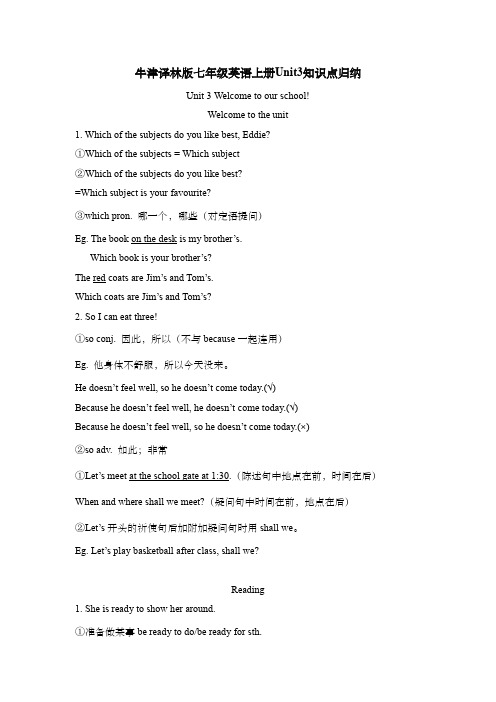
牛津译林版七年级英语上册Unit3知识点归纳Unit 3 Welcome to our school!Welcome to the unit1. Which of the subjects do you like best, Eddie?①Which of the subjects = Which subject②Which of the subjects do you like best?=Which subject is your favourite?③which pron. 哪一个,哪些(对定语提问)Eg. The book on the desk is my brother’s.Which book is your brother’s?The red coats are Jim’s and Tom’s.Which coats are Jim’s and Tom’s?2. So I can eat three!①so conj. 因此,所以(不与because一起连用)Eg. 他身体不舒服,所以今天没来。
He doesn’t feel well, so he doesn’t come today.(√)Because he doesn’t feel well, he doesn’t come today.(√)Because he doesn’t feel well, so he doesn’t come today.(×)②so adv. 如此;非常①Let’s meet at the school gate at 1:30.(陈述句中地点在前,时间在后)When and where shall we meet?(疑问句中时间在前,地点在后)②Le t’s开头的祈使句后加附加疑问句时用shall we。
Eg. Let’s play basketball after class, shall we?Reading1. She is ready to show her around.①准备做某事be ready to do/be ready for sth.get ready to do/get ready for sth.Eg. Are you ready for dinner?=Are you ready to have dinner?②show vt. 带,领(show-shows/showing)show sb. around(sp.) 带某人(到某地)四处转转;领某人参观……Eg. Do you want to show me around(Wuxi)?2. We are now in front of the classroom building.①front n. 前面,前部in front of... 在……前面(在外部)Eg. There is a tree in front of our classroom.in the front of... 在……前部(在内部)Eg. The driver sits in the front of the bus.②front adj. 前面的,前部的the front door/the front garden/front legs3. What’s the building over there?①此句中over there充当后置定语,修饰building;The building is over there.此句中over there充当表语,表示地点。
牛津译林版英语七年级上册Unit3知识点梳理
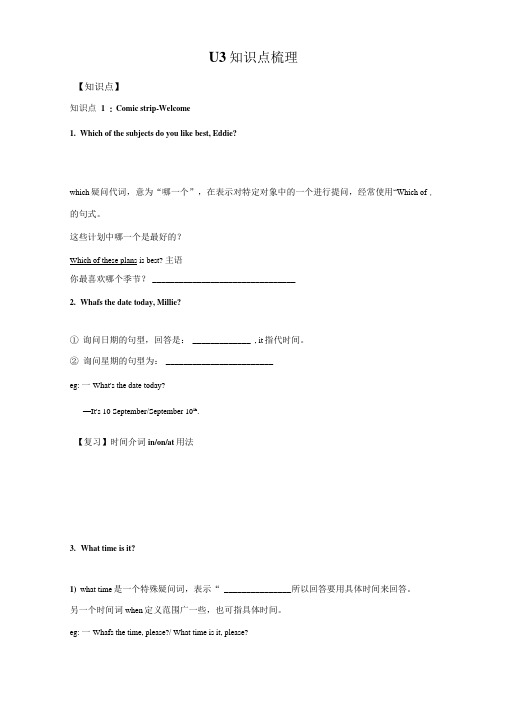
U3知识点梳理【知识点】知识点 1 : Comic strip-Welcome1.Which of the subjects do you like best, Eddie?which疑问代词,意为“哪一个”,在表示对特定对象中的一个进行提问,经常使用“Which of,的句式。
这些计划中哪一个是最好的?Which of these plans is best? 主语你最喜欢哪个季节?________________________________2.Whafs the date today, Millie?①询问日期的句型,回答是:_____________ , it指代时间。
②询问星期的句型为:________________________eg: 一What's the date today?—It's 10 September/September 10lh.【复习】时间介词in/on/at用法3.What time is it?1)what time是一个特殊疑问词,表示“ _______________ 所以回答要用具体时间来回答。
另一个时间词when定义范围广一些,也可指具体时间。
eg: 一Whafs the time, please?/ What time is it, please?一It's nine o'clock.2)询问时还可以用 ____________________________或 ___________________________或 ___________________________ 等句型。
4.1 have two cakes, and you have one.句中的one是代词,并非数词,它代替上文提到的同一类人或事物中的任一个,其复数形式为oneso这些书不错,我想买_本。
_________________________________解析:one与it (单选)我有一些苹果,你想要一个吗?_______________________________我有_支新钢笔,我喜欢它。
七年级英语上册Unit3知识梳理译林牛津版解读
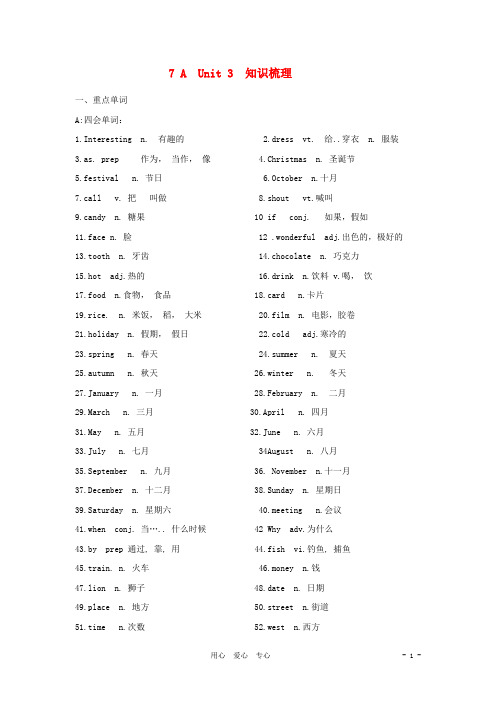
7 A Unit 3 知识梳理一、重点单词A:四会单词:1.Interesting n. 有趣的2.dress vt. 给..穿衣 n. 服装3.as. prep 作为,当作,像4.Christmas n. 圣诞节5.festival n. 节日6.October n.十月7.call v. 把叫做 8.shout vt.喊叫9.candy n. 糖果 10 if conj. 如果,假如11.face n. 脸 12 .wonderful adj.出色的,极好的13.tooth n. 牙齿 14.chocolate n. 巧克力15.hot adj.热的 16.drink n.饮料 v.喝,饮17.food n.食物,食品 18.card n.卡片19.rice. n. 米饭,稻,大米 20.film n. 电影,胶卷21.holiday n. 假期,假日 22.cold adj.寒冷的23.spring n. 春天 24.summer n. 夏天25.autumn n. 秋天 26.winter n. 冬天27.January n. 一月 28.February n. 二月29.March n. 三月 30.April n. 四月31.May n. 五月 32.June n. 六月33.July n. 七月 34August n. 八月35.September n. 九月 36. November n.十一月37.December n. 十二月 38.Sunday n. 星期日39.Saturday n. 星期六 40.meeting n.会议41.when conj. 当….. 什么时候 42 Why adv.为什么43.by prep 通过, 靠, 用 44.fish vi.钓鱼, 捕鱼45.train. n. 火车 46.money n.钱47.lion n. 狮子 48.date n. 日期49.place n. 地方 50.street n.街道51.time n.次数 52.west n.西方53.candle n. 蜡烛 54.way n. 方式, 方法55.light n. 光, 光线 56.warm adj 暖和的, 温暖的B: 单词转换:1.celebrate (v.)---celebration (n.)2.interest (n.)—interesting(adj.) interested(adj.)3.wonder(n.)---wonderful(adj) wonderfully(adv.)4.tooth(n.)---teeth(复数)5.cut—cut—cut(v.)6.nation(n.)----national(adj).7.excite---exciting/ excited (adj)8.穿过(prep.)----through(内部穿过) across(表面穿过)二、重点短语:1.Happy Halloween!万圣节快乐!2. New Year’s Day 新年,元旦3.Chinese New Year 春节4. .May Day 五一国际劳动节5.the Dragon Boat Festival 端午节,龙舟节6. the Mid--Autumn Festival 中秋节7. Children’s Day 儿童节8. Teachers’ Day 教师节9. National Day 国庆节10..celebrate Christmas 庆祝圣诞节11.at Easter在复活节12. Thanksgiving Day感恩节13.one’s favourite festival 最喜欢的节目.14dress up as 装扮,精心打扮15.have a long holiday 度一个长假16.have a party 开聚会17 play a game called“trick or treat”玩一个叫“不招待就使坏”的游戏a game calle d…=a game named …=a game with the name一个名叫…的游戏18. knock on/at 敲门19. play a trick on…对…使用诡计20. rice dumplings粽子21. traditional Chinese food 传统中国风味的食品22.lion dance 舞狮子23. .red packets 红包24. be on holiday 在度假25.this year 今年26.cut out 切成,剪成27.receive a letter from… 收到…..的来信28.hot drinks 热饮29.on the evening of October 31st 在十月31号的晚上30.look like看起来像31..see the doctor 看医生32..during the first week of November 在十一月的第一周期间33.go to school by bus 乘公共汽车上学34.be very excited 非常激动/兴奋35. at night 在夜晚36.on the other side of 在…的另一边37.try to do sth 努力做某事38.in the west 在西方,在西方国家39.in the USA 在美国40 .buy sb .Sth. 给某人买东西41. sharp teeth锋利的牙齿42. in the pencil case= in the pencil box在铅笔盒里43. chat with sb.on the Internet在互联网上与某人聊天44.plan to do sth. 计划做某事45. help sb. do sth. 帮助某人做某事46. so much如此(多),这么47. in many ways通过许多方式48. in a special costume穿特殊的服装49.tell sb. about sth. 告诉某人某事50. put up…on the wall把……挂在墙上51. at the weekend在周末52. make a plan制定计划53. from 9 p.m. to midnight从晚上9.00到午夜54.paint one’s face给某人的脸上涂上油彩.55.like to do sth. 喜欢做某事56. thank sb. for doing sth.感谢某人做某事57. give sb. sth. as a treat以……招待某人58.give us some candy as a treat= give us a treat of some candy59. special costumes with masks带面具的特别服装60. .make pumpkin lanterns制作南瓜灯61. make A out of B=make A from B用B制作A62. make sth. for sb.=make sb. sth. 为某人制作某物.…63.put sth. in=put sth. into…把某物放进64. want to do sth. 想要做某事65. at breakfast (lunch/ supper) 在吃早餐(午餐/晚餐)的时候66.Monkey King美猴王67.take sb. for a walk带某人去散步68.Christmas presents圣诞礼物69.shine through..照射过70. through the eyes透过眼睛71.go swimming 去游泳72.go to the Reading Club 去读书俱乐部73.like fishing 喜欢钓鱼74.take place发生75.talk about谈论三、语法A.时间介词的用法1.in+ 年/季节/月份eg: in 2008/ in spring/summer/autumn/ winterin January/February/ March/ April/ May/ June /July/ August/ September/October/November/December2.in+一天里的一段时间eg: in the morning/ afternoon/ evening3.on+具体的日子eg: on Monday (morning) on the night of September on a cold winter evening4.at+点时间eg: at 8 注:at Hawllowen/ night/ noonB.some 与 any 的用法1.Some1). 用于肯定句2). 用于婉转问句,或当我们提出要求或请求,又期望得到对方“肯定”的回答时。
Unit3知识点梳理牛津译林版英语七年级上册

牛津译林版七上Unit 3 知识点梳理1.Which of the subjects do you like best, Eddie? 埃迪,你最喜欢哪一门学科?= Which is your favourite subject, Eddie?like...best:“最喜欢……”= favourite。
which:疑问代词,“哪一个”。
辨析:which/whatwhich:“哪一个”,表示在一定范围内进行选择。
what:“什么”,不强调限定范围。
2.I have two cakes, and you have one. 我有两块蛋糕,你有一块。
辨析:one/itone:指代同类人或物中的一个,但不是同一个。
(同类不同物)复数:onesit:指代上文中提到的事物本身。
(同类同物)复数:they3.So I can eat three! 所以我能吃三块(蛋糕)!so:conj.“因此,所以”。
4.问日期:What date is it...? = What’s the date ...?5.英语日期的表达:(1)日、月、年:“月”与“年”之间用逗号,书写时,“日”用序数词的形式,也可以用阿拉伯数字的形式。
读时,“日”要读成序数词,而且前面要加the。
(2)月、日、年:“日”与“年”之间用逗号,书写时,“日”用序数词的形式,也可以用阿拉伯数字的形式。
读时,“日”要读成序数词。
6.提问具体的时刻:What time is it? = What’s the time?回答:It’s + 具体时间.辨析:what time/whenwhat time:提问具体时刻,通常询问钟点。
when:常询问日期、年份或月份,也可以询问时刻。
英语中时间的表示:(1)先时钟数,后分钟数:six thirty “6:30”;ten fifty “10:50”(2)先分钟数,后时钟数:①当分钟数小于等于30分钟时:twentyfive past nine “9:25”;half past eight “8:30”②当分钟数大于30分钟时:ten to ten “9:50”;three to eleven “9:57”(3)整点:时钟数(+ o’clock)six (o’clock) “6:00”(4)半点:时钟数+ thirty/half past + 时钟数 e ight thirty/half past eight “8:30”注意:15分钟可以用a quarter。
(完整版)新译林七年级上册第三单元知识点梳理
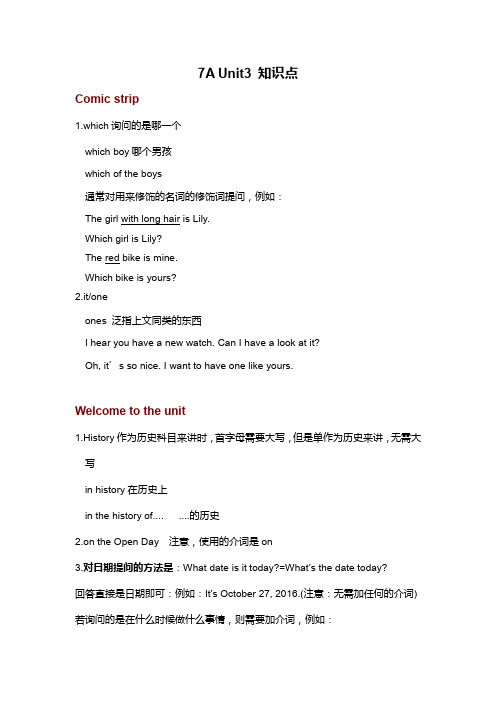
7A Unit3 知识点Comic strip1.which询问的是哪一个which boy哪个男孩which of the boys通常对用来修饰的名词的修饰词提问,例如:The girl with long hair is Lily.Which girl is Lily?The red bike is mine.Which bike is yours?2.it/oneones 泛指上文同类的东西I hear you have a new watch. Can I have a look at it?Oh, it’s so nice. I want to have one like yours.Welcome to the unit1.History作为历史科目来讲时,首字母需要大写,但是单作为历史来讲,无需大写in history在历史上in the history of…. ….的历史2.on the Open Day 注意,使用的介词是on3.对日期提问的方法是:What date is it today?=What’s the date today?回答直接是日期即可:例如:It’s October 27, 2016.(注意:无需加任何的介词)若询问的是在什么时候做什么事情,则需要加介词,例如:When do you have a test?We have a test on October 27, 2016.对星期提问的方法:What day is it today?= What’s the day today?今天是星期几?回答:It is Thursday.对点时间提问的方法:What time is it?= What’s the time?回答:It’s 17:23.4.家长会the parents’ meeting 注意,parents’使用的是复数名词的名词所有格形式,直接在其后面加’have a parents’ meetingat the parents’ meeting在具体的点时间前加的是介词at at ten o’clock在上下午,使用的介词是in in the morning/ evening/ afternoon在学校门口用的是介词at at the school gateReading1.be ready to do sth. 准备做某事,后加动词不定式I’m ready to buy you a new dress.2.so + adj./ adv. 例如:so big/fat/beautiful3.show(1)show sb. around 带某人参观某地注意:此处sb.应使用的是宾格,show为动词,动词后加人称代词宾格形式,构成动宾。
Unit3知识点复习讲义牛津译林版英语七年级上册
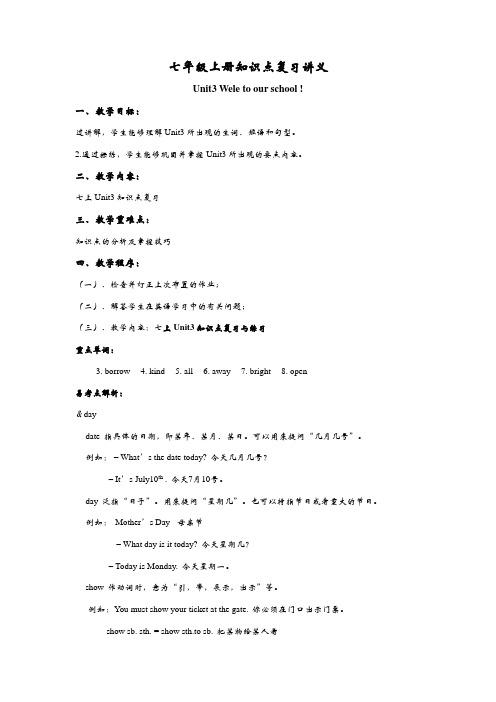
七年级上册知识点复习讲义Unit3 Wele to our school !一、教学目标:过讲解,学生能够理解Unit3所出现的生词、短语和句型。
2.通过操练,学生能够巩固并掌握Unit3所出现的要点内容。
二、教学内容:七上Unit3知识点复习三、教学重难点:知识点的分析及掌握技巧四、教学程序:(一)、检查并订正上次布置的作业;(二)、解答学生在英语学习中的有关问题;(三)、教学内容:七上Unit3知识点复习与练习重点单词:3. borrow4. kind5. all6. away7. bright8. open易考点解析:&daydate 指具体的日期,即某年、某月、某日。
可以用来提问“几月几号”。
例如:-What’s the date today? 今天几月几号?-It’s July10th . 今天7月10号。
day 泛指“日子”。
用来提问“星期几”。
也可以特指节日或者重大的节日。
例如:Mother’s Day 母亲节-What day is it today? 今天星期几?-Today is Monday. 今天星期一。
show 作动词时,意为“引,带,展示,出示”等。
例如:You must show your ticket at the gate. 你必须在门口出示门票。
show sb. sth. = show sth.to sb. 把某物给某人看例如:Could you show me your photos? = Could you show your photos to me?你能把你的照片给我看看吗?show sb. around 意为“带领某人参观”。
例如:Could you show us around Nanjing when you are free?当你有空时,你能带领我们参观南京吗?3.borrow&lendborrow 意为“借,借用”;反义词是lend(借出)。
牛津译林版七年级英语上册Unit3知识点归纳

牛津译林版七年级英语上册Unit3知识点归纳知识点一同步知识梳理【知识梳理】1. Look! I have two cakes, and you have one. So I can eat three!看!我有两块你有一块。
因此我能吃三块蛋糕!(P30)【解析】 it代指同类同物,one代指同类异物。
【举例】 I have a book. It is new.我有一本书,它是新的。
Your dictionary is good. I want to buy one too.你的字典很好,我也想买一本。
【实践】单项选择。
( )① Your book is interesting. Can you let me read_______?A. oneB. the oneC. itD. them【点译】 Keys:B. it代指同类同物your book.【解析】 so在此作连词,意为“因而;所以”。
【举例】 I am from England, so I speak English.我来自英国,所以我说英语。
【警示】用英语表达“因为……,所以……”时,用了because就不能再用so,用了so就不能再用because,两者只用其一。
【举例】 He is three years old, so he can't go to school.= He can't go to school because he is three years old.他三岁,所以不能上学。
【实践】单项选择。
( )(②Biology is very interesting, _______I like it.A. becauseB. soC. butD. to【点译】 Keys:B.句意:生物很有趣,所以我很喜欢。
2. which of the subjects do you like best,Eddie? (P30)【用法】pron. 哪一个【举例】It's hard to say which is better.很难说哪一个好些。
江苏省句容市行香中学七年级英语上册 Unit 3 Welcome to our school单元知识梳理 (新版)牛津版

Unit3Welcome to the unit1. Which of the subjects do you like best?Like sth. best= sth. is sb’s favourite=Which/What is your favourite subject?e.g.My favourite subject is English.=I ______English________.2. one/itone:同类不同件 it:同类同件e.g Your coat is very nice,I want to buy______.(one)同是外套,但不是你身上那件Your pen is very beautiful. Can I borrow_____?(it)就指你那支钢笔3.What’s the date today?(问日期) What’ the time?/What time is it?(问具体时间)Reading1. show sb . sth . =show sth. to sb . 展示某物给某人看2. look beautiful:look是系动词,后通常接形容词,名词(名词短语)作表语,常用的系动词还有taste,sound,feel,smel l,seem etc.3.辨析:in front of 与in the front ofIn front指在范围外的前面e.g I stand in front of you.of指在范围内的前面e.g I stand in the front of the classroom.(人仍在教室里面) In thefront ofe.g There_______a book on the desk.(is) There______some books on the desk.(are)There_______a book,a p en and two rulers on the desk.(is)5.Who’s that man in a white shirt?这里的 in a white shirt是介词短语作定语,修饰man.类似的还有a girl in red.Grammar人称代词主格和宾格主格:用来做句子中的主语宾格:用来做句子中的宾语主格:第一人称:I(单) we(复) 第二人称you(单) you(复) 第三人称:he,she,it(单)they(复)宾格:第一人称:me(单) us(复) 第二人称you(单) you(复) 第三人称:him,her,it(单)them(复)e.g Lucy is our friend._____is good at English.We all like______.第一空作主语,填she,第二空作宾语,填her.Integrated skills1.表到达的词:reach,get to,arrive(in,at),in后接大地点,at后接小地点*若后接的是地点副词,则不用介词,get home,arrive home*若未指明所到达的地点,只能用arrive. e.g I will arrive.2.open可表状态,也可表动作e.g She is opening the door.(动作,动词) The door is open.(状态,形容词)3. borrow st h from sb(借进) lend sth to sb/lend sb sth(借出)4.go to school:去上学 go to the school:去学校Task1.thanks for=thank you for2. far away from离….很远3.It takes me about an hour to get to school.It takes sb +钱、时间+to do sth4.a few(表肯定,后接可数名词复数) a little(表肯定,后接不可数名词)Few(表否定,后接可数名词复数) little(表否定,后接不可数名词)5.on foot(表方式) walk(表动作)表方式的还有:by bike,by bus,by car,by ship/sea,by plane,对应的表动作的有:ride,take a bus,drive,take a ship,flye.g: I go to school by bike.=I ride to school.七年级上册Unit 3 词汇过关序中文English 序号中文English号1 哪一个 pron 18 只有,仅 adv.2 最好 adv 19 当然 adv.3 地理n. 20 种类 n.4 历史 n. 21 借 vt.5 日期 n. 22 信 n.6 会议 n. 23 不多,少数 pron.7 引,带 vt. 24 离开 adv.8 前面n. 259 建筑物 n. 2610 地面 n. 2711 明亮的 adj. 2812 现代的 adj. 2913 大厅 n. 3014 日记 n. 3115 再说一遍 excl. 3216 电话 n. 3317 费时 vt. 34No. Chinese English1 在…前面(两种)2 带领某人参观3 在一楼4 看一看5 让我想想6 下课后7 通电话8 从...到..9 起床10 做某事花了某人多少钱或时间11 阅览室12 各种各样的13 向…借14 看上去很漂亮15 一些16 远离17 步行18 一切顺利19 开放日20 家长会21 向某人打招呼22 开会23 教学楼24 穿白色衬衫的男士一些重点词的词形转换:1.good/well—better—best2.meet(v)—meeting(n)3.so+adj/adv such+(a/an)+adj+n4.build(v)—building(n)。
Unit3知识点梳理2023-2024学年牛津译林版英语七年级上册

第三讲 7A Unit3 Language Point 梳理1.让某人(不)做某事let/ make/ have sb. (not) _____ sth.get/ tell/ ask sb. (not) _____ sth.2. 九大建议句型两个祈使句:Let’s do….Shall we do…?两个Why:Why not sb. do…?Why don’t sb. do…?两个about:What about doing…?How about doing…?两个would:Would you like to do…?Would you please do…?⭐had better do….3.walk to spl. 步行去某地= go to spl. on foot类似用法:骑车去某地ride to spl.= go to spl. by bike ( on one’s bike)开车去某地drive to spl. =go to spl. by car (in one’s car)坐公交/地铁去某地take the bus/underground to spl.= go to spl. by bus/ underground (on the bus/underground)①和某人一起散步walk with sb.带某人去散步take sb. for a walk②遛狗walk one's dog = take the dog for a walk③去散步go for a walk= take a walk= go walking④five minutes’ walk(易错)=()How far is it from here to you school?It’s about twenty __________ (minute) walk.4.I walk to my bowl many times a day. (ic) 我一天走向我的碗好几次。
牛津译林版七年级英语上册Unit 3知识点讲解
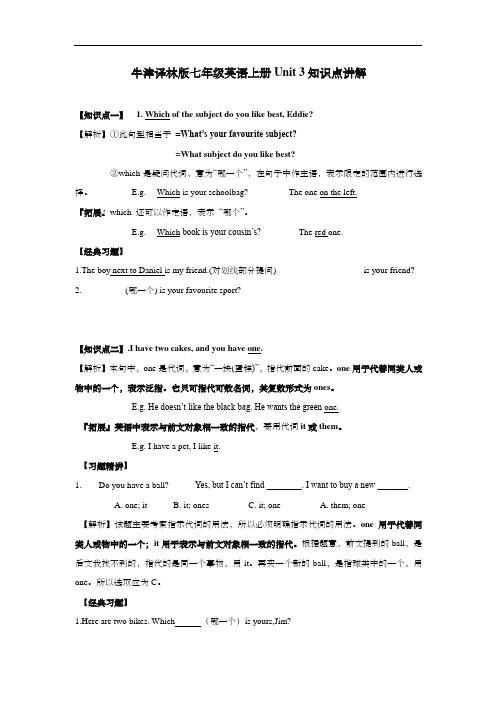
牛津译林版七年级英语上册Unit 3知识点讲解【知识点一】 1. Which of the subject do you like best, Eddie?【解析】①此句型相当于=What’s your favourite subject?=What subject do you like best?②which是疑问代词,意为“哪一个”,在句子中作主语,表示限定的范围内进行选择。
E.g. ---Which is your schoolbag? --The one on the left.『拓展』which 还可以作定语,表示“哪个”。
E.g. ---Which book is your cousin’s? ----The red one.【经典习题】1.The boy next to Daniel is my friend.(对划线部分提问) ________ _________ is your friend?2.__________(哪一个) is your favourite sport?【知识点二】.I have two cakes, and you have one.【解析】本句中,one是代词,意为“一块(蛋糕)”,指代前面的cake。
one用于代替同类人或物中的一个,表示泛指。
它只可指代可数名词,其复数形式为ones。
E.g. He doesn’t like the black bag. He wants the green one.『拓展』英语中表示与前文对象相一致的指代,要用代词it或them。
E.g. I have a pet, I like it.【习题精讲】1. ---Do you have a ball? ---Yes, but I can’t find ________. I want to buy a new _______.A. one; itB. it; onesC. it; one A. them; one【解析】该题主要考察指示代词的用法,所以必须明确指示代词的用法。
牛津译林版七年级上册第三单元 知识点

Unit 3 Welcome to our school单元知识点总览1.which 用作疑问代词,意为“哪一个”。
可用在选择疑问句中。
Which is your car, the black one or the red one? 哪辆是你的车,黑色的还是红色的?2.best 作为形容词表示最好的(good 的最高级)Tom is my best friend.作为副词表示最,最好地(well 的最高级)I work best in the morning.like …best 最喜欢… I like English best.= My favourite subject is English.like better 更喜欢…. I like football better than volleyball. 比起排球我更喜欢足球。
3.So 连词,意为“因此,所以”但是注意此时so 和because 不能连用。
It's very cold, so I wore a heavy coat.= Because it's very cold, I wore a heavy coat.so 副词如此地,这么,那么常放在形容词前,表示程度。
Our classroom is so beautiful! So 副词这样,如此,用来代替整个句子。
I think so./ I hope so.3.What's the date today? = What date is it today?询问日期,常用答语为“It is + 日期”。
What's the date today? 今天几号?—— It's 5(th) November. 11月5日。
【注意】英语中年月日的表达方式与汉语不同,一般采用日月年或月日年的顺序。
4. What day is it today? 今天是星期几?It’s Monday/Tuesday/Wednesday…5. What time is it? =What's the time? 几点了?It’s eight o’clock.What time...?是用来询问具体时间点的句型。
江苏省句容市天王中学:Unit3 Task 学案(牛津译林版七年级上册)

【课前导学】Ask and answer the following questions about your school.●What school do you study at?●How many classrooms are there at your school?●Do you have a music room, an art room, or a computer room?●Do you have a library or a reading room?●Do you have a school hall?●Is your playground big?●How do you get to school?【课堂学习】一、Ask and answer the questions below.1.What is the name of his school?2. Is his school big or small?3. How many classrooms do they have?4. Do they have a playground?5. Do they have a library?6. Do they have a reading room?7. How does he go to school?8. How long does it take him to go to school?二、Find out the structure of the letter..Para. 1Para. 2&3Para. 4Para. 5三、Read the letter again and find out the useful expressions.A. There are---classrooms in---B. The teacher looks very young.C. I ride /walk to school.D. The playground is very---E. I study at---F. The teachers are very nice.G . The library looks modern.H. My classroom is on the ground floor.I. I go to school by bike/bus/on footJ. We have a playground/library---K. There isn’t a school hall/reading room -L. It takes me an hour to get to school.【课后拓展】书面表达(10分)假设下面是你校的示意图,请你根据示意图及说明用英语写一篇80词左右的短文。
江苏牛津译林七年级上册Unit 3基础知识

知识点精析
一、重点词汇
1.(1)begin/start + sth. / doing / to do
家长会在下午两点开始。
The parents’ meeting begins at two o’’clock in the afternoon
看看这些花,他们很漂亮。
Look at these flowers. They are very beautiful.
那只熊猫很可爱。人人都喜欢它。
That panda is cute. Everyone likes it.
Helen是我表妹。我常和她一起玩。
Helen is my cousin. I often play with her.
辨析:there be与have/has的用法区别:
there be表示客观存在
have/has表示所属或拥有
4. on the ground floor在底楼/在一楼
ground floor为英式英语,表示底层,一楼,而美式英语中的一楼为first floor.
我们的教学楼有6层,我们的教室在二楼。
我的妹妹生病了,我需要照顾她。
My sister is ill. I need to look after her.
练习
一.根据句意及汉语提示完成句子
1.The ________(礼堂) on the ground floor looks very clean.
2.We're happy to study in the ________(现代的) classroom.
江苏牛津译林七年级上册Unit 3基础知识
译林版七年级英语上册第三单元知识点总结

译林版七年级英语上册第三单元知识点总结一、词汇知识点整理:on foot步行far away from远离a few一些,少量learn about学得,获知would like sth/to do sth想要/想要做某事after class下课后on this day在今天all kinds of各种各样on the phone在电话中look at看ground floor底层,一楼on the wall在墙上by bus乘公共汽车in front of在……前面let me see让我看看go to school去上学reading room阅览室borrow from从……借……get to school到达学校on the Open Day在开放日二、结构用法:Thank you for doing sth为做某事而感谢你be ready to do sth准备做某事It takes sb some time to do sth花费某人多少时间做某事show sb around领某人参观need to do sth需要做某事三、句式用法:1、Which of the subjects do you like best, Eddie? P30 Eddie,(在所有科目中,你最喜欢哪一科?subjects 是复数。
= What’s your favourite subject ? 你最喜欢哪一科目?这个句型subject用单数。
subject 科目(9科):Chinese 语文Math数学English英语History历史Biology生物Geography 地理Music 音乐Art美术PE体育.2、--- What’s the date today ? P 31 今天几号?(date, 日期,问日期)回答用--- It’s 9 October/ It’s October 9. (它是)十月九日。
新译林七年级上册第三单元知识点梳理(K12教育文档)

新译林七年级上册第三单元知识点梳理(word版可编辑修改)编辑整理:尊敬的读者朋友们:这里是精品文档编辑中心,本文档内容是由我和我的同事精心编辑整理后发布的,发布之前我们对文中内容进行仔细校对,但是难免会有疏漏的地方,但是任然希望(新译林七年级上册第三单元知识点梳理(word版可编辑修改))的内容能够给您的工作和学习带来便利。
同时也真诚的希望收到您的建议和反馈,这将是我们进步的源泉,前进的动力。
本文可编辑可修改,如果觉得对您有帮助请收藏以便随时查阅,最后祝您生活愉快业绩进步,以下为新译林七年级上册第三单元知识点梳理(word版可编辑修改)的全部内容。
7A Unit3 知识点Comic strip1。
which询问的是哪一个which boy哪个男孩which of the boys通常对用来修饰的名词的修饰词提问,例如:The girl with long hair is Lily.Which girl is Lily?The red bike is mine.Which bike is yours?2。
it/oneones 泛指上文同类的东西I hear you have a new watch。
Can I have a look at it?Oh, it’s so nice。
I want to have one like yours。
Welcome to the unit1。
History作为历史科目来讲时,首字母需要大写,但是单作为历史来讲,无需大写in history在历史上in the history of…. ….的历史2。
on the Open Day 注意,使用的介词是on3.对日期提问的方法是:What date is it today?=What’s the date today?回答直接是日期即可:例如:It’s October 27, 2016。
(注意:无需加任何的介词)若询问的是在什么时候做什么事情,则需要加介词,例如:When do you have a test?We have a test on October 27, 2016.对星期提问的方法:What day is it today?= What’s the day today?今天是星期几?回答:It is Thursday.对点时间提问的方法:What time is it?= What’s the time?回答:It’s 17:23.4.家长会 the parents’ meeting 注意,parents’使用的是复数名词的名词所有格形式,直接在其后面加'have a parents’ meetingat the parents’ meeting在具体的点时间前加的是介词at at ten o'clock在上下午,使用的介词是in in the morning/ evening/ afternoon在学校门口用的是介词 at at the school gateReading1.be ready to do sth。
Unit3词汇知识点梳理复习及练习牛津译林版七年级英语上册
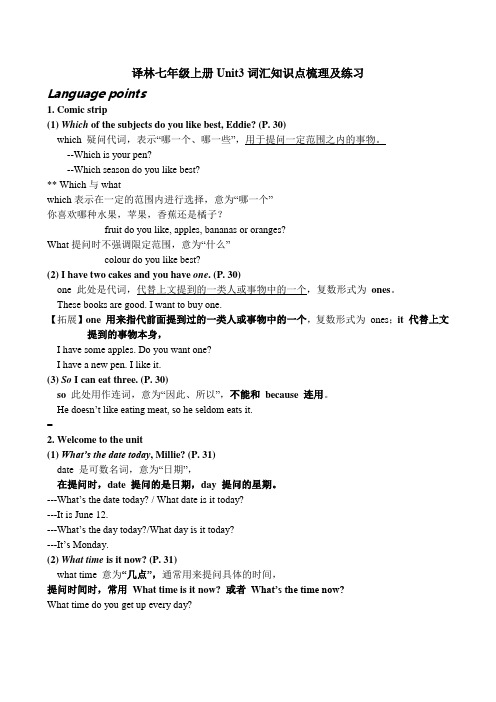
译林七年级上册Unit3词汇知识点梳理及练习Language points1. Comic strip(1) Which of the subjects do you like best, Eddie? (P. 30)which 疑问代词,表示“哪一个、哪一些”,用于提问一定范围之内的事物。
--Which is your pen?--Which season do you like best?** Which与whatwhich表示在一定的范围内进行选择,意为“哪一个”你喜欢哪种水果,苹果,香蕉还是橘子?___________ fruit do you like, apples, bananas or oranges?What提问时不强调限定范围,意为“什么”___________ colour do you like best?(2) I have two cakes and you have one. (P. 30)one 此处是代词,代替上文提到的一类人或事物中的一个,复数形式为ones。
These books are good. I want to buy one.【拓展】one 用来指代前面提到过的一类人或事物中的一个,复数形式为ones;it 代替上文提到的事物本身,I have some apples. Do you want one?I have a new pen. I like it.(3) So I can eat three. (P. 30)so此处用作连词,意为“因此、所以”,不能和because 连用。
He doesn’t like eating meat, so he seldom eats it.= __________________________________________________________________2. Welcome to the unit(1) What’s the date today, Millie? (P. 31)date 是可数名词,意为“日期”,在提问时,date 提问的是日期,day 提问的星期。
- 1、下载文档前请自行甄别文档内容的完整性,平台不提供额外的编辑、内容补充、找答案等附加服务。
- 2、"仅部分预览"的文档,不可在线预览部分如存在完整性等问题,可反馈申请退款(可完整预览的文档不适用该条件!)。
- 3、如文档侵犯您的权益,请联系客服反馈,我们会尽快为您处理(人工客服工作时间:9:00-18:30)。
1. would like1)would like to do sth = want to do sth. 意思是“想要做某事;愿意做某事”,语气较委婉。
如:Would you like to play tennis? 你想打网球吗?2)would like sb to do = want sb. to do sth.意思是“想要某人做某事”。
如:I would like you to go swimming with me. 我想要你和我一起去游泳。
3)would like sth.= want sth. 意思是“想要某物”。
如:Would you like some apples? 你要苹果吗?2. so1) 作连词,意思是“因此,所以”。
如:I love reading, so I am good at Chinese. 我热爱阅读,所以我擅长语文。
2 ) 作副词,意思是“如此,这么;非常”。
如:Your classroom is so clean and bright. 你们教室非常干净明亮。
3. show1) 作动词,意思是“出示,给...看”。
常用结构:show sb sth. = show sth. to sb. 意思是“给某人看某物”。
如:show me your photo = show your photos to me 把你的照片给我看看2) show sb. around sp. 意思是“带某人参观某地”。
如:Please show me around your school library. 请带我参观你们学校图书馆。
4. front作名词,意思是“前面”。
与之相关的两个词组是:in front of 在……(外部)的前面;in the front of 在……(内部)的前面。
如:There is a big tree in front of the teaching building. 教学楼前有一棵大树。
I like sitting in the front of the bus. 我喜欢坐在公交车的前部。
5. looklook和see的区别是look强调动作,但不一定看得见;see强调结果。
如:Please look at the blackboard. 请看黑板。
Can you see the birds in the tree? 你能看到树上的鸟吗?6. openopen可作形容词,意为“开着的,营业的”,其反义词为closed。
形容词open和closed强调状态,动词open和close 强调动作。
如:The shop opens at 8 a.m. and closes at 8 p.m. 这家商店早上八点开业,晚上八点歇业。
The shoe shop is open, but the clothes shop is closed today.今天这家鞋店正在营业,但那家服装店歇业。
7. kind1)作名词,意思是“种类”。
例如:all kinds of 各种各样different kinds of 不同种类的There are all kinds of animals in the zoo. 动物园里有各种各样的动物。
2)作形容词,意思是“亲切的;和蔼的”。
如:They are very kind to me. 他们对我很好。
8. borrow1)borrow意思是“借某物”,指从别人那里借来东西(借入)。
常用结构:borrow something from somebody / somewhere。
如:Do you often borrow books from the library? 你经常从图书馆借书吗?2)lend也有“借”的意思,但lend指把东西借给别人(借出)。
常用结构:lend sb sth” 或lend something to somebody。
如:Can you lend me your pen? 你能借给我你的钢笔吗?Will you please lend your bike to me? 你能把自行车借给我吗?9.it takes (sb) 一段时间to do sth 做某事花了(某人)……时间It takes me 30 minutes to finish my homework.=I spend 20 minutes finishing my homework.It took an hour to have supper with him. 和他一起吃晚饭花了一个小时10. few1)用于修饰可数名词复数,意思是“不多的,少数的,几乎没有。
”(表达否定的意思)。
a few用于修饰可数名词复数,意思是“一些,少量,有几个”(表达的是肯定意思)。
如:There are a few apples on the table. 桌子上有几个苹果。
There are few apples on the table. 桌子上几乎没苹果。
2)little修饰不可数名词,意思是“几乎没有”(表达否定的意思)。
a little修饰不可数名词,意思是“有一点儿”(表达的是肯定意思)。
如:Hurry up. There is little time left. 快点,没时间了。
Don’t worry. There is a little time left. 别急,还有一点时间。
11. away作副词,意思是“离开,远离”。
如:She is away from home today. 她今天不在家。
My house is only 3 kilometers away from my school. 我家离学校仅三公里远。
2) far away from 的意思是“远离”。
如:Do you live far away from your school? 你住的离你们学校远吗?注意:far 不能与具体的数字连用。
12.thank sb for sth因某事而感谢某人Thank you for your letter 感谢你的来信Thank my teacher for her help 感谢我的老师提供的帮助thank sb for doing sth 因做某事而感谢某人Thank you for telling me the good news 感谢你告诉我这个好消息You should thank him for giving you a chance.(机会)你应该感谢他给了你一次机会thanks for sth =thank you for sth因某事而感谢你thanks for doing sth =thank you for doing sth因做某事而感谢你七年级上册Unit 3 词汇过关七年级上册Unit 3 必背短语1. 最喜欢….. like …best2. 哪门科目which subject = which of the subjects3. 你最喜欢哪门科目?Which subject do you like best?= Which is your favourite subject?4. 学校开放日the School Open Day5. 今天几月几号?What ‘s the date today?= What date is it today?6. 今天星期几?What day is it today?7. 现在几点钟?What time is it now?8. 家长会\ 运动会the parents’ meeting \ the sports meeting9. 在下午2点at two o’clock in the afternoon = at 2 p.m.10. 观看我们两堂课watch two of our lessons11. 在学校大门口见面meet at the school gate12. 看起来很美|年轻| 现代look beautiful \ young \ modern13. 这么大so big14. 带领某人参观……show sb around….15. 在……(里面)的前面in the front of …16. 在……(外面)的前面in front of…17. 在教室大楼的后面behind the classroom building18. 在底楼(一楼)on the ground floor (英) \ on the first floor (美)19. 干净而明亮clean and bright20. 这边走this way21. 一个美术室an art room22. 在学校礼堂in the school hall23. 开会have a meeting \ have meetings24. 那个穿白色衬衫的男人that man in a white shirt25 去大厅\ 图书馆go to the hall \ the library26. 在开放日on the Open Day27. 来参观我们的学校come and visit our school28. 从……到……. from … to …29. 从我家到学校from my home to the school30. 骑自行车上学go to school by bike= ride a bike to school31. 乘汽车上学go to school by bus = take a bus to school32. 步行上学go to school on foot = walk to school33. 花某人多长时间干某事It takes sb some time to do sth34. 住在我们学校附近live near our school35. 各种各样的书all kinds of books36. 从图书馆借书borrow books from the library37. 向某人借某物borrow sth from sb38. (为做某事)感谢某人thanks for (doing) sth = thank you for (doing) sth39. 离….远far away from…。
